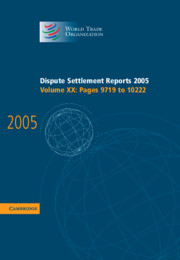Book contents
- Frontmatter
- Contents
- European Communities – Customs Classification of Frozen Boneless Chicken Cuts - Complaint by Thailand (WT/DS286): Report of the Panel
- United States – Anti-Dumping Measures on Oil Country Tubular Goods (OCTG) from Mexico (WT/DS282): Report of the Appellate Body
- Cumulative List of Published Disputes
United States – Anti-Dumping Measures on Oil Country Tubular Goods (OCTG) from Mexico (WT/DS282): Report of the Appellate Body
Published online by Cambridge University Press: 13 December 2017
- Frontmatter
- Contents
- European Communities – Customs Classification of Frozen Boneless Chicken Cuts - Complaint by Thailand (WT/DS286): Report of the Panel
- United States – Anti-Dumping Measures on Oil Country Tubular Goods (OCTG) from Mexico (WT/DS282): Report of the Appellate Body
- Cumulative List of Published Disputes
Summary
INTRODUCTION
Mexico and the United States each appeals certain issues of law and legal interpretations developed in the Panel Report: United States – Anti-Dumping Measures on Oil Country Tubular Goods (OCTG) from Mexico (the “Panel Report”). The Panel was established to consider a complaint by Mexico against the United States regarding, inter alia, the continuation of anti-dumping duties on oil country tubular goods (“OCTG”) from Mexico following the conduct of a five-year or “sunset” review of those duties, as well as certain United States laws and procedures relating to such reviews.
On 11 August 1995, the United States Department of Commerce (the “USDOC”) issued an anti-dumping duty order on OCTG from Mexico, based on a dumping margin of 23.79 per cent for Tubos de Acero de Mexico, S.A. (“TAMSA”) and for “all other” Mexican producers, including Hylsa, S.A. de C.V. (“Hylsa”). The USDOC subsequently reduced this margin to 21.70 per cent. On 3 July 2000, the USDOC initiated a sunset review of the order. In its determination of the likelihood of continuation or recurrence of dumping, the USDOC determined that revocation of the order would be likely to lead to continuation or recurrence of dumping at the rate of 21.70 per cent for TAMSA, Hylsa, and “all other” Mexican producers. In its determination of the likelihood of continuation or recurrence of injury, the United States International Trade Commission (the “USITC”) determined that revocation of the anti-dumping duty orders on OCTG (other than drill pipe) from Mexico and certain other countries would be likely to lead to continuation or recurrence of material injury within a reasonably foreseeable time. As a result of these determinations by the USDOC and the USITC, the USDOC did not revoke the order on OCTG (other than drill pipe) from Mexico.
Before the Panel, Mexico challenged, under the Agreement on Implementation of Article VI of the General Agreement on Tariffs and Trade 1994 (the “Anti-Dumping Agreement”), the General Agreement on Tariffs and Trade 1994 (the “GATT 1994”), and the Marrakesh Agreement Establishing the World Trade Organization (the “WTO Agreement”), inter alia:
- Type
- Chapter
- Information
- Dispute Settlement Reports 2005 , pp. 10127 - 10206Publisher: Cambridge University PressPrint publication year: 2007

